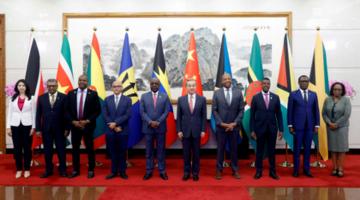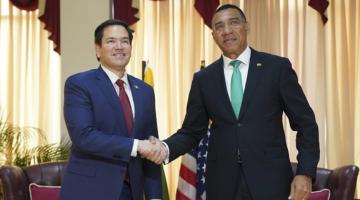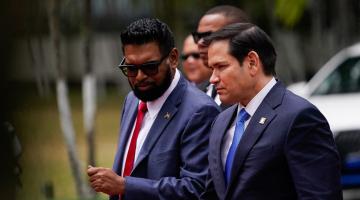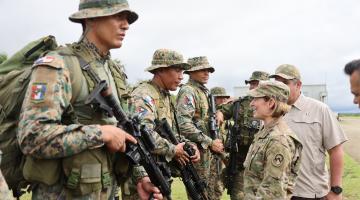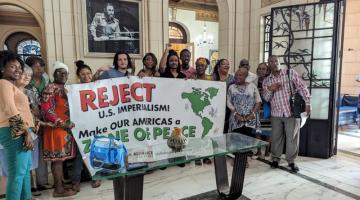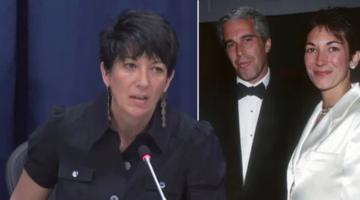Brazilian President Jair Bolsonaro and US President Joe Biden on June 9 at Summit of the Americas. (Photo: Jim Watson/AFP/Getty Images)
The U.S. effort to control the narrative at the Summit of the Americas ended as a diplomatic and foreign policy disaster. The imperative to dominate blew up in the collective faces of the Biden foreign policy team.
This article was originally published in Dissident Voice.
The just concluded Summit of the Americas is nothing but a show of the Empire’s fleeting leadership in a region that the Empire considers as its backyard.
Mr. Biden, the US President, expressed his hopes as he said: “I think I find no reason why the Western Hemisphere, the Western Hemisphere over the next 10 years, does not develop into the most democratic hemisphere in the world, most democratic region in the entire world.”
He identified important factors in the region: “We have everything. We have the people, we have the resources and we have more democracies in this hemisphere than any other hemisphere.”
So, the US leader expressed hope: “This is a lot we can do, but a lot of it matters in the private enterprise side equation.”
He mentioned “enormous ideas and opportunities” in the region.
But a few stark facts went absent: imperialist exploitation, intervention, dictation, bulldozing of peoples’ aspirations, endeavors and dignity. None can expect democracy while democracy is defined by external bosses, not by people. Imperialist interest and democracy are in perpetual conflict where democracy gets killed by imperialist interest as the interest denies people their rights and spaces in economy and politics. The region in discussion goes through this reality. The summit itself is the evidence: countries were arbitrarily excluded from the summit. With this practice, dictation, how can one dream of democracy or patronizing of democracy? Whatever patronization will go there in the name of democracy is patronization of the forces that serve the patron: imperialist interest.
Now, the problems the Empire is facing in the region are two: (1) Peoples’ increasing struggle for democracy and dignified life, and (2) China – the emerging economic power’s increasing assistance in the area of economy in countries. The Empire finds China as its powerful contender there in the region, as it finds China in the Indo-Pacific and in Africa. Probably, it’ll find China in some parts of Europe and the Middle East also. Amazing! It seems China is haunting the Empire everywhere and all the time!! Rep. Michael McCaul (R-Texas), House Foreign Affairs Committee Ranking Member, this week warned that China poses a real threat of dominance in Central America, which he called “our own backyard”. (Fox News, “Biden touts Western Hemisphere ‘opportunities,’ democracies at summit that excluded Latin American dictators”, June 9, 2022)
But the Empire has already begun losing its strong position in the region. Carrie Filipetti, executive director of the Vandenberg Coalition and a former deputy special representative for Venezuela at the U.S. Department of State told Fox News Digital: “The fact that many leading nations in the hemisphere refuse to participate in the Summit of the Americas — and that the United States has refused to allow the participation of the legitimate government of Venezuela — shows how weak our relationships have become.” (ibid.) A reality is emerging.
A Reuters report (“Biden unveils new Latin America economic plan at reboot summit dogged by dissent”, June 9, 2022) describes something about the summit:
“[A] regional summit marred by discord and snubs over the guest list.”
“[N]agging concerns that Washington, at times, is still trying to dictate to its poorer southern neighbors.”
“The line-up of visiting heads of state and government in attendance was thinned down to 21 […]”
Mr. Biden’s “agenda has been undermined by the partial boycott by leaders […]”
Mr. Biden “found himself welcoming a larger-than-normal contingent of foreign ministers sitting in for their national leaders […]”
This is not all. A Los Angeles, June 10 datelined AP report (“Salvadoran leader rebuffs Blinken effort to bolster summit”) tells another story:
“It was the sort of diplomatic rebuff a small country like El Salvador generally can rarely afford to make.”
“[S]enior U.S. officials frantically worked the phones seeking to boost attendance […]”
“Among those efforts, the State Department sent a message that Secretary of State Antony Blinken wanted to speak with President Nayib Bukele last weekend, a rare show of comity from a Biden administration that for months had been blasting the Central American leader as a power-hungry populist.”
“‘Participating in the Summit is a very good opportunity for President Bukele to explain his perspective to the Salvadoran community in LA and Joe Biden,’ Assistant Secretary of State Brian Nichols wrote in a message to Bukele’s ambassador in Washington.”
“In the end, Bukele didn’t take the bait and the call never happened […]”
“Another request to set up a call with Blinken, made through the US Embassy in San Salvador, was similarly rebuffed, according to the two people, one of whom showed The Associated Press a copy of the messages.”
“The concerted effort by Blinken to reach out to one of the Biden administration’s frequent targets in Latin America underscores the lengths to which U.S. officials went to avoid an embarrassing flop at the summit.”
Bukele was one of 11 Western Hemisphere leaders who have stayed away from the summit.
“Bukele’s lack of a response to Blinken’s request for a phone call”, the report said, “convinced US officials there wasn’t much they could do to improve relations and the US eventually dropped the diplomatic outreach […]”
More of the story is there in Time, the famous weekly.
Time writes (“The Summit of the Americas Was Meant To Counter China’s Influence. Instead, It Showed How Weak the U.S. Is”, June 10, 2022):
“A gathering of Western Hemisphere leaders in Los Angeles […] gave President Joe Biden a rare and vital opportunity to mend burned bridges and counter growing Chinese influence in Latin America and the Caribbean. Instead, analysts say, the Summit of the Americas has achieved neither.
“Much has changed in the Americas in the nearly three decades since the U.S. last hosted the triennial summit. In 1994, then-President Bill Clinton met with all but one of Western Hemisphere leaders […] At the time, leaders were clamoring for a seat at the table with Washington.
“[….]
“The event — which Biden said would showcase ‘bold ideas and ambitious actions’ — was soured by snubs and diplomatic tensions before it even began. [….]
“The hotly-anticipated first ever meeting between Biden and Brazilian President Jair Bolsonaro also almost didn’t happen, with reports that Bolsonaro was also planning to skip the summit.
“For these reasons, Biden was worried that ‘no one would come to the party,’ says Thomas Traumann, a political consultant and head of communications under former Brazilian President Dilma Rousseff. Washington had in turn dispatched an adviser to convince the far-right leader to attend. Bolsonaro later insisted that Biden had agreed not to raise longstanding points of contention between the two men — including growing deforestation in the Amazon — a claim that Biden’s national security adviser, Jake Sullivan, denied to US reporters.
“Just two days before Thursday’s meeting, Bolsonaro […] once again spread false claims around the legitimacy of Biden’s 2020 election win. Biden didn’t publicly acknowledge the comments, as he was ‘desperate’ to salvage the summit in the wake of Mexico’s snub, Traumann says.
“‘The need to get Bolsonaro there made the United States look weak,’ says Christopher Sabatini, senior Latin American research fellow at London-based think tank Chatham House. But at a time of waning US influence in Latin America, Sabatini says Biden had few options.”
These reports and observations from the mainstream narrate a certain reality: The Empire’s leadership is fleeting in the region considered by imperialists as their courtyard. But, a lot has changed there in the so-called backyard. Like Trade Winds, a Change Wind is blowing throughout the continent. Statements a number of leaders from the hemisphere made in the summit in presence of the US President are unimaginable. The leaders are from geographically, and in terms of economy, small countries. How does that force of bold utterances originate, and what does that signify? A Change Wind is blowing, and it’ll blow with setbacks, but it’ll continue blowing, and enrich and embolden the region, and the Empire will find its leadership is gradually fleeting away.
Despite this trend of time, there’re a few utterances that sound arrogant. The above mentioned Reuters report said: “Biden’s national security adviser Jake Sullivan told reporters the choice by some leaders not to attend reflected their own ‘idiosyncratic decisions’ […]” It may happen that that was “idiosyncratic”, or it may happen that those decisions were symptoms of a political trend, and the political trend has grown out of a few economic-political questions that are related to the Empire, at one end, the peoples in the region, at the other, as imperialism has bled Latin America, the people in Latin America, a lot and since long. A cessation of the practice is the requirement in the region.
Farooque Chowdhury is a freelance writer based in Dhaka, Bangladesh. His books in English include Micro Credit, Myth Manufactured (ed.) (2007), The Age of Crisis (2009), and The Great Financial Crisis, What Next?: Interviews with John Bellamy Foster (ed.), Dhaka: Books (2012), 190 pp. Read other articles by Farooque.



